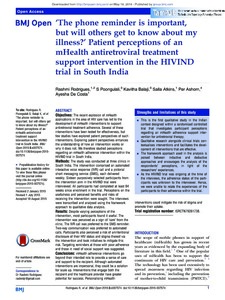‘The phone reminder is important, but will others get to know about my illness?’ Patient perceptions of an mHealth antiretroviral treatment support intervention in the HIVIND trial in South India
Rodrigues, Rashmi; Poongulali, S; Balaji, Kavitha; Atkins, Salla; Ashorn, Per; De Costa, Ayesha (2015)
Rodrigues, Rashmi
Poongulali, S
Balaji, Kavitha
Atkins, Salla
Ashorn, Per
De Costa, Ayesha
2015
BMJ Open 5 11
e007574
Lääketieteen yksikkö - School of Medicine
Julkaisun pysyvä osoite on
https://urn.fi/URN:NBN:fi:uta-201605181609
https://urn.fi/URN:NBN:fi:uta-201605181609
Tiivistelmä
Objectives The recent explosion of mHealth applications in the area of HIV care has led to the development of mHealth interventions to support antiretroviral treatment adherence. Several of these interventions have been tested for effectiveness, but few studies have explored patient perspectives of such interventions. Exploring patient perspectives enhances the understanding of how an intervention works or why it does not. We therefore studied perceptions regarding an mHealth adherence intervention within the HIVIND trial in South India.
Methods The study was conducted at three clinics in South India. The intervention comprised an automated interactive voice response (IVR) call and a pictorial short messaging service (SMS), each delivered weekly. Sixteen purposively selected participants from the intervention arm in the HIVIND trial were interviewed. All participants had completed at least 84 weeks since enrollment in the trial. Perceptions on the usefulness and perceived benefits and risks of receiving the intervention were sought. The interviews were transcribed and analysed using the framework approach to qualitative data analysis.
Results Despite varying perceptions of the intervention, most participants found it useful. The intervention was perceived as a sign of ‘care’ from the clinic. The IVR call was preferred to the SMS reminder. Two-way communication was preferred to automated calls. Participants also perceived a risk of unintentional disclosure of their HIV status and stigma thereof via the intervention and took initiatives to mitigate this risk. Targeting reminders at those with poor adherence and those in need of social support was suggested.
Conclusions mHealth adherence interventions go beyond their intended role to provide a sense of care and support to the recipient. Although automated interventions are impersonal, they could be a solution for scale up. Interventions that engage both the recipient and the healthcare provider have greater potential for success. Personalising mHealth interventions could mitigate the risk of stigma and promote their uptake.
Methods The study was conducted at three clinics in South India. The intervention comprised an automated interactive voice response (IVR) call and a pictorial short messaging service (SMS), each delivered weekly. Sixteen purposively selected participants from the intervention arm in the HIVIND trial were interviewed. All participants had completed at least 84 weeks since enrollment in the trial. Perceptions on the usefulness and perceived benefits and risks of receiving the intervention were sought. The interviews were transcribed and analysed using the framework approach to qualitative data analysis.
Results Despite varying perceptions of the intervention, most participants found it useful. The intervention was perceived as a sign of ‘care’ from the clinic. The IVR call was preferred to the SMS reminder. Two-way communication was preferred to automated calls. Participants also perceived a risk of unintentional disclosure of their HIV status and stigma thereof via the intervention and took initiatives to mitigate this risk. Targeting reminders at those with poor adherence and those in need of social support was suggested.
Conclusions mHealth adherence interventions go beyond their intended role to provide a sense of care and support to the recipient. Although automated interventions are impersonal, they could be a solution for scale up. Interventions that engage both the recipient and the healthcare provider have greater potential for success. Personalising mHealth interventions could mitigate the risk of stigma and promote their uptake.
Kokoelmat
- Artikkelit [6140]
